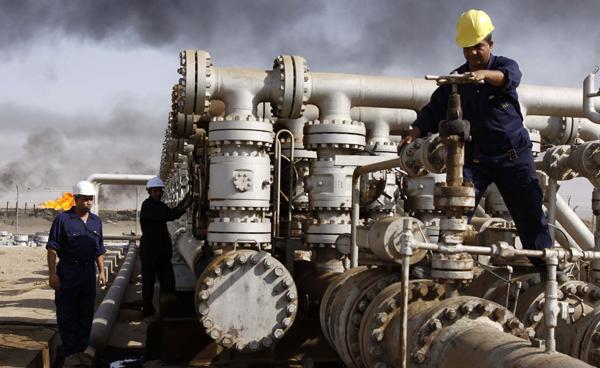You are here
Oil crash has economic benefits but geopolitical risks for US
By AFP - Feb 01,2016 - Last updated at Feb 01,2016

This file photo taken on August 21, 2013, shows an oil well jack pump near Tioga, North Dakota (AFP photo)
NEW YORK — The oil price crash is mostly a godsend for the United States, delivering American consumers and businesses cheaper gasoline prices while hobbling the economies of adversaries like Russia.
But analysts say that the longer the oil price stays so low, the greater the chances it will generate new geopolitical problems that Washington would not like to see.
Even if the 70 per cent plunge in crude prices has battered the homegrown US oil industry, overall its economy benefits: it remains a net importer of oil and as the price of crude falls, the country's trade imbalance improves.
"There's no question that low oil prices are very good for the US. Painful for some people obviously, but for the US economy and US consumers a very good thing," said Bruce Everett, a former ExxonMobil official and professor at Tufts University.
There are apparent strategic benefits of cheap oil, too.
Countries like Russia, Venezuela and Iran, with which Washington shares chilly relations, are overly dependent on oil exports and their economies have been heavily battered by the downturn.
"If you don't care especially about the [other] oil producers, it's a plus," said George Perry of Brookings Institution.
But the flip side is that strains from a loss of oil income can trigger destabilising behaviour as well.
Energy specialist Jan Kalicki of the Wilson Centre posed the question of whether Russia would be less or more troublesome on the world scene if the economic climate worsens.
"The pressure is on Russia from oil prices and their general economic decline," Kalicki indicated. "You could make an argument that the Russians have been influenced to some extent by that in taking stronger steps internationally... in Ukraine or in Syria for example."
That, he said, serves to "take domestic attention away from the economic problems that it is facing".
Convergence of interests
For Iran, the price fall comes as the country is being permitted to resume a high level of oil exports with the lifting of international nuclear sanctions on the country.
The net effect, income-wise, is little significant immediate gain for the country, according to Anthony Cordesman, a Middle East and security expert at the Centre for Strategic and International Studies in Washington.
Even at a price of $40 a barrel, some 15 per cent higher than now, the resumption of oil exports won't have a big economic effect for the country of 84 million people.
However, he said, any surge in income could become the focus of an intensified internal power struggle pitting military versus civilian needs, according to Cordesman.
That fight "may become even more serious”, he added.
"The impact of the nuclear agreement on Iran's future petroleum revenues will be far more limited than many thought when the agreement was signed, and Iran will face serious internal pressure over how any additional revenue will be used," he elaborated.
Cordesman raised another potential pitfall from falling oil revenues across the Gulf and other producers: social turmoil as governments are forced to cut spending.
"It's very unclear that stability in the Middle East is going to get better if the same forces which tend to drive extremism, all of which relate to youth unemployment and economic growth and modernisation, are not going to be helped by a decline in oil revenues by exporting states," he said.
Kalicki added that the fall in the oil price hurts US allies too, including Mexico and Canada, both of whose economies depend significantly on crude production.
In that sense, he remarked, oil producers and consumers have similar interests in a firmer market.
"There is a rebalancing going on between purchasers and the buyers," he continued, creating "a convergence of interest developing among countries active in the oil marketplace in a way that it hasn't in the past".
For that reason, the United States needs to be concerned over "the broader impact of lower oil prices on the international economy and on countries trying to fend their way which are not creating issues internationally", he said.
Separately, many Americans are wondering when they will begin to see the benefits of cheap oil.
The technological breakthroughs of hydraulic fracturing, or fracking, have revolutionised the market for black gold, making the United States the world's leading petroleum exporter.
So why do things feel so bleak to many Americans? It may be just a question of timing, some economists say.
"On a net basis, the decline of oil prices is or will be positive for the US economy," said Angel Ubide, a senior fellow at the Peterson Institute for International Economics.
Because the negative impact is "faster and more concentrated in time", people are already feeling it, Ubide added. "If we look at it in two or three years' time, we'll be able to conclude that the decline in oil prices on net was positive. But we need some time for that."
Steve Murphy of Capital Economics sounded a note of caution, however, saying much will depend on how long oil prices remain low.
"The magnitude and duration of the slump in oil prices has far exceeded what we originally expected, and the longer it persists, the harder it is to argue that decline will ever be a net positive for the US economy," he said.
"Lower prices should have boosted real economic growth in the US. Instead, the hit to domestic investment has been unrelenting, while households still haven't spent any of their savings," he added.
US financial authorities, starting with Federal Reserve Chair Janet Yellen, insist that lower gasoline prices should free consumers' purchasing power. Premium gas at the pump is now below $2 a gallon on average (0.48 euros a litre), a seven-year low.
And yet few signs of impact on consumer spending seem to have materialised, even if the American consumer remains the locomotive of today's modest levels of US growth.
Retail sales rose only 2.1 per cent in 2015, according to official figures published Friday, down from a yearly average of 5.1 per cent from 2010 to 2014.
Murphy said Americans have saved $115 billion thanks to cheap gas over the past 18 months, but rather than spending it, "personal saving has increased by $120 billion, suggesting that households have saved every last dime from lower pump prices".
Ubide noted, however, that "once the level of savings is higher, at some point the consumer can use those savings to spend".
There are, in any case, more winners than losers in the United States, according to Reza Varjavand, an economics professor at Saint Xavier University in Chicago.
"Transportation, airlines, consumers — they all win. The losers are mostly overseas," he indicated.
Varjavand noted that stock markets have suffered and "older people who have money in retirement accounts and pensions, they lose”.
"But consumers generally win," he told AFP.
'Temporary,' you said?
As for industry, the petroleum and manufacturing sectors are suffering.
The extractive industries — mining, coal and oil — lost nearly 130,000 jobs last year, according to the labour department. The number of active wells operating in the United States fell by 68 percent during the year.
The finances of several US producer states are suffering to varying degrees.
"Alaska, North Dakota, Louisiana, Oklahoma, Texas, West Virginia and Wyoming are all states that will experience some amount of economic or fiscal fallout as a result of sustained low oil prices," indicated a statement from the rating service Standard & Poor's.
Low energy prices will continue to affect the inflation rate, though Yellen has said for months that this will be a "transitory effect". The US central bank wants to see a steadying of inflation around 2 per cent.
"Transitory can be a long time," Ubide said ironically, adding that the impact on inflation of cheaper and cheaper oil is bound, mathematically, to lessen.
"At some point, the effect of the decline in price is going to disappear from inflation," he said. "The lower the oil price goes, the less impact it has on inflation on an incremental basis."
Some experts, including at Morgan Stanley, don't rule out the possibility of a $20 barrel amid the continued strengthening of the greenback.
Will the savings that American households enjoy because of cheaper oil lead to an easing of wage demands?
Standard & Poor's seemed to nod in that direction when it noted that "low oil and gas prices provide an offset to still sluggish wage growth".
Related Articles
LONDON — Oil plunged to fresh 12-year lows under $27 on Wednesday, slammed by gloomy economic forecasts, China's slowdown and abundant crude
PARIS — Oil prices may have rebounded off 12-year lows struck last month, but any hope for a broader recovery in the market would be misplac
LONDON — It's been a long and tortuous journey, but the eurozone economy is finally back to the size it was before the global financial cris


















